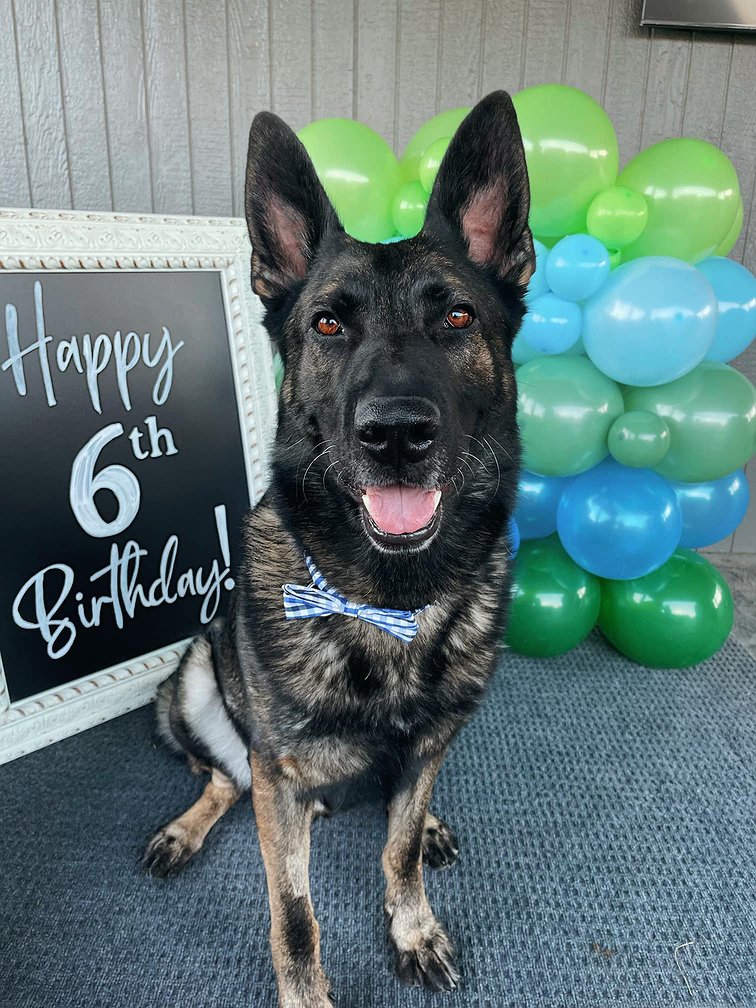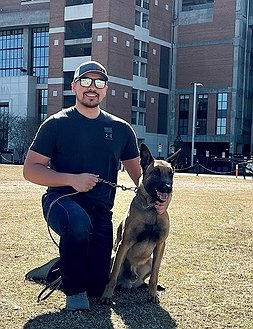GCSO K-9 officers discuss dog selection, entering law enforcement
EPHRATA — Grant County Sheriff’s Office K-9 officers Malli and Uno are settling in with their new handlers after being acquired by the department in early March. The two Belgian Malinois, Malie and Uno, are working through training with handlers Deputy Zane Bundy and Luis Jimenez, respectively.
Both officers have had experience with canine officers in the past, Jimenez as K-9 Zedd’s handler and Bundy has done some informal understudy work with Jimenez.
“I got into law enforcement to help the community, give back. Kind of classic reasons. I’ve grown to really love it,” Bundy said. “I grew up with animals, horses, dogs – everything. So, I’ve always had a good connection with animals, and I think just moving into my career in law enforcement and luckily, coming to Grant County where there is a canine program, I got to work with the dogs over the last couple of years. I was fortunate enough wo be on the crew with (Jimenez). He helped me a lot to get to work with Zedd. I got to learn how the dogs work, learn how dogs could be used, so he kind of mentored me a lot there and helped create that drive to want to become part of the canine program.”
Bundy said he’s been in law enforcement for just over four years, with two and a half of those years being with GCSO, and he’s learned to appreciate how the presence of a K-9 officer can deescalate situations. People are afraid of getting bitten by dogs after personal experiences with dogs in public or other situations. He’s a proponent of dogs in law enforcement because he feels they’re “the best less-lethal tool” an officer can have available.
“I’ll say in my time, I think almost every dog deployment that I’ve been a part of has always ended up in someone surrendering, and not an actual live bite,” Bundy said.
Jimenez said he started to consider working in law enforcement when Lt. Ric Char was his soccer coach while he was in school. Char showed up in his all-green uniform and that looked cool and as he got to know more about being an officer, he was drawn to the career. He joined GCSO’s Reserve Deputy Program in 2015 and eventually became a full-time deputy. Char was working with K-9 Chica at the time, and Jimenez helped with training. That led to a love of working with dogs and eventually, Jimenez became Zedd’s handler. With Zedd getting to retirement age, it was time to select someone to replace him on the force and allow Zedd the retirement he’d earned.
Selecting the new dogs was a bit of a process, Jimenez said. They went down to Alabama Canine in Northport, Ala., to choose from 11 potential canine partners. Over a few days, they work with the dogs to see how they respond to different situations such as loud noises, slick floors, darkness and other factors that might be commonly encountered in the field with a human partner. Bite exercises, environmental changes, and working with officers to see how well they interact are also involved. Screening is good for both the dogs and the department, he said. Knowing what a dog can and can’t handle helps to identify whether or not the dog will have to be shipped back and a new candidate brought in. That can be an added expense, but also a stressor on the animals and impact K-9 coverage for GCSO.
An important factor is making sure the dog latches on when he bites, Jimenez said.
“We want the dog to keep biting and hold the guy because then it becomes an officer safety issue. If the guy that the dog’s biting (starts) screaming and all of a sudden the dog comes back, we have to go in there and we don’t know (if the suspect’s) armed or what may happen, so we want to make sure the dog is confident, nonstop,” Jimenez said.
While the department doesn’t want to put the dogs in dangerous situations, human life is the priority, Jimenez said, so the dog is there to help ensure officers return home to their families.
The dogs also have to be obedient and workable in other situations. Jimenez said he often gets requests from members of the public to pet Zedd, and that’s likely to occur with any K-9. However, a K-9 officer isn’t a pet. They’re trained for a specific purpose and want their space. Often, a dog in uniform simply isn’t in the mood to be handled by a stranger, so it’s always best to check with the officer and leave the animal be if asked not to interact with the dog. Making certain that the dog knows its boundaries in situations is important so that it remains at its handler's heels, ready to follow commands, and doesn’t go where it may interact with unfamiliar people.
Zedd is still working while Uno and Mallie are in training, but a donation from Moses Lake Industries allowed GCSO to get new dogs in time for Zedd’s pending retirement, Sheriff Joey Kriete said.
Jimenez said Zedd needs to retire not just because of his age, but also because of his health. Last year, Jimenez noticed one of Zedd’s paws dragging a bit while tracking. A subsequent veterinary visit and testing showed that Zedd has degenerative myelopathy — a condition similar to ALS in humans.
While the condition is eventually fatal, the goal is to give Zedd the best quality of life possible during the time he has left, Jimenez said.
“And so, that’s when we came to the decision, ‘You know. Hey. I think it’s time we started thinking about retirement for him and thinking about his home life,’” Jimenez said.
Mallie and Uno are in the process of completing hundreds of hours of training with another dog handler with the Moses Lake Police Department to establish the remainder of the commands needed for active work with GCSO.
R. Hans “Rob” Miller may be reached at editor@columbiabasinherald.com. A U.S. Army veteran, he lives with his wife and three dogs in Ephrata.
 GCSO K-9 Officer Zedd poses for a picture on his 6th birthday in 2022. Zedd has developed a condition similar to ALS – Lou Gehrig's disease – in humans, so will be retiring soon in order to ensure the best quality of life possible for him. His handler, Deputy Luis Jimenez, will be working with a new partner named Uno.
GCSO K-9 Officer Zedd poses for a picture on his 6th birthday in 2022. Zedd has developed a condition similar to ALS – Lou Gehrig's disease – in humans, so will be retiring soon in order to ensure the best quality of life possible for him. His handler, Deputy Luis Jimenez, will be working with a new partner named Uno.






